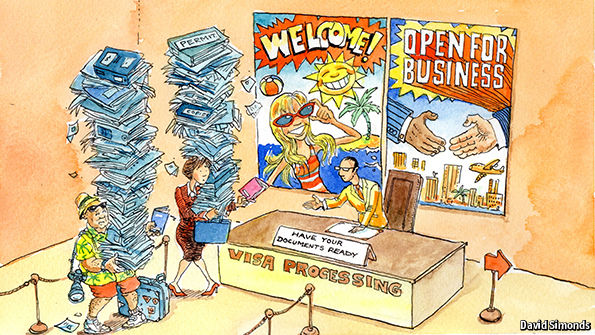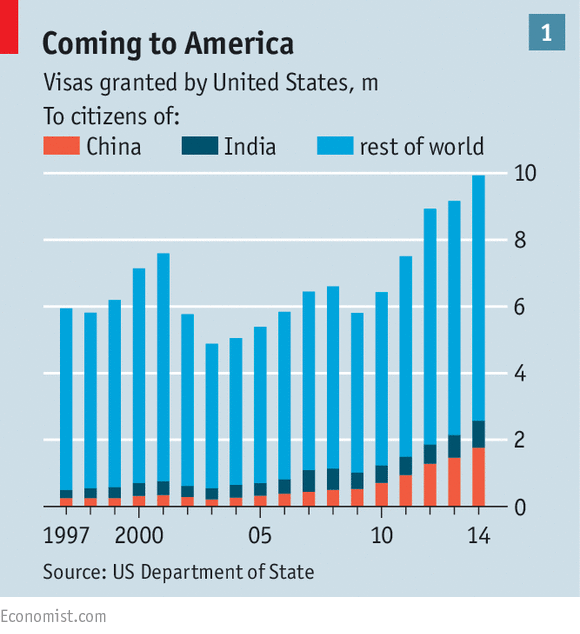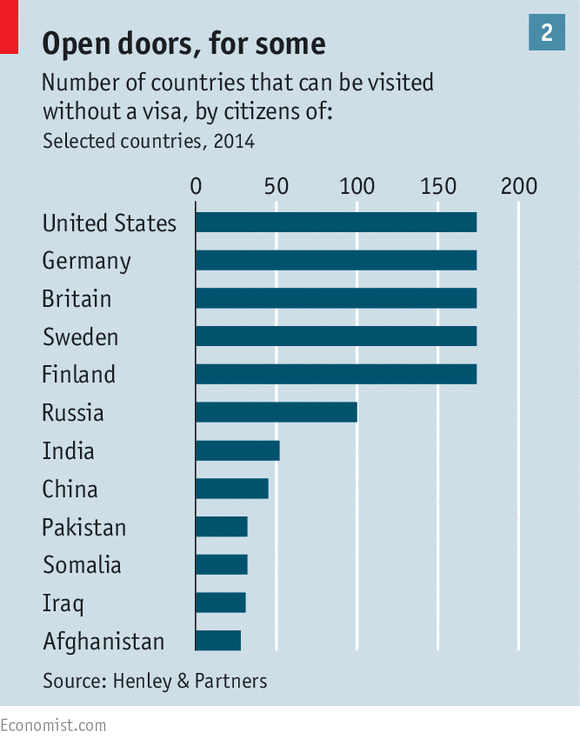Travel visas
A strange sort of welcome
Governments are deterring business travellers and tourists with cumbersome visa requirements that do little to make their countries more secure
..

THE rise of big emerging economies like China and India, and the steady march of globalisation, have led to a surge in the numbers of people wanting to travel abroad for business or tourism. As a result, demand for visas is at unprecedented levels. In the fiscal year to the end of September 2014 the United States granted just under 10m visas—up from around 6m in 1997, despite blips in the wake of the terrorist attacks of September 11th 2001 and the global financial crisis of 2007-08 (see chart 1).

Citizens of America, Britain and some other rich countries can travel to most places without a visa. Chinese and Indian travellers are far more likely to have to apply for them. And citizens of a few benighted places, such as Iraq and Afghanistan, have to submit to the cost and bureaucracy—and often the humiliation—of the visa-application process to get to most places (see chart 2).

The most sensible response to this surge in demand for short-term visas would be for governments to streamline the application process and scrap the most onerous requirements. But governments are often not sensible about such things. The 26 European countries with a common visa policy—the “Schengen group”—require tourists from India and other developing countries to provide several months’ worth of bank statements and pay slips. Visitors to Britain often have to fill in a ten-page application form, including details of every trip abroad for the past ten years. Business travellers to India must provide two references. Mexico has scrapped a rule requiring visa applicants (including women) to submit a description of their moustaches. But in 2016 America will start requiring visas for some travellers who currently do not need them—if, for example, they have visited Iran, Iraq, Syria or Sudan in the previous five years.
In many cases, instead of simplifying the visa process, governments have offloaded it to private contractors. Travellers may now have to pay a service fee to the company handling their application on top of the standard visa fee. The biggest firm in this growing business is VFS Global, which is part of Kuoni, a Swiss tourism company. Starting from a single premises in Mumbai in 2001, handling applications for American visas, VFS now has more than 1,900 visa centres in 124 countries, processing paperwork for 48 governments.
Of the 113m visa applications made worldwide in 2013, one in three went through a contractor, reckons VFS, which has about half the market. Its main rivals are CSC, with around 10% of the market, and TLScontact, with around 7%. Dozens of smaller firms make up the remainder of the market. The private contractors collect and verify the applicant’s paperwork, ensure that forms are filled in properly, take fingerprints and other biometric information and collect the fees. The consular staff of the destination country simply decide whether to grant the visa, and slap a sticker in the passport of successful applicants.
For the contractors, it is a nice little earner. VFS probably enjoys operating margins of 20%, reckons Kathleen Gailliot, an analyst at Natixis, a French bank. The companies are given a free hand to pad their earnings with pricey “premium” services. In Mumbai, for example, VFS offers Indians applying for British visas a text on their mobile phones to notify them that their passports are ready for collection, at 128 rupees ($2) a shot. For an extra 2,548 rupees, applicants can use a special “lounge” area while submitting their documents, and have their passports posted back to them.
VFS accounts for just 5% of Kuoni’s revenues but more than 60% of its operating profits. So bright are the division’s prospects that its parent company is getting out of the tour-operator business, which it has been in since 1906, to concentrate on visa-processing and a few other specialist travel services.
Until VFS opened its Mumbai office, applicants had to queue for an average of five hours in the sweltering heat outside the American consulate. After the job was handed to the contractor, the typical waiting time fell to one hour. However, applicants still have no choice but to submit to whatever petty demands contractors make—such as, say, banning them from using mobile phones while they sit waiting for their appointments. If the staff are rude, the queues are badly managed or the “extras” extravagantly priced, travellers can hardly take their business elsewhere.
The application-processing firms are profiting both from travellers’ lack of choice and from governments’ failure to consider the economic damage caused by their visa requirements. There is scant evidence that making all travellers submit the same documents every time they want to travel, or provide extensive financial details, protects countries from terrorists or illegal immigrants. In contrast, there is evidence of how liberal visa regimes bring in the bucks. A report in 2014 from the European Parliament, “A Smarter Visa Policy for Economic Growth”, estimated that over-strict visa rules probably cost the EU economy 250,000 jobs and €12.6 billion ($13.8 billion) a year in lost output. It recommended requiring fewer documents from applicants, handing out longer visas and simplifying the whole process.
Since Britain is not part of the Schengen group, Chinese people taking a tour of Europe have to apply for a second visa to cross the Channel. Only 6% of them do so, says Euromonitor, a research firm. The British Tourist Authority has complained that the country’s visa policies cost it £2.8 billion ($4.1 billion) a year in lost revenue.
However, amid worries about the wave of asylum-seekers from Syria and elsewhere, governments in Europe and beyond will face pressure to keep making life hard for tourists and business travellers—even as other departments of those same governments spend heavily on promoting tourism and foreign investment.
0 comments:
Publicar un comentario